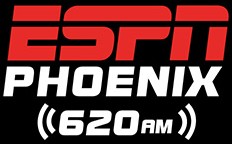Related Research Articles

KPNX, virtual and VHF digital channel 12, is an NBC-affiliated television station serving Phoenix, Arizona, United States that is licensed to the suburb of Mesa. The station is owned by Tegna Inc. KPNX's studios are located at the Republic Media building on Van Buren Street in downtown Phoenix, and its transmitter is located atop South Mountain on the city's south side.

KKLA-FM is a commercial radio station licensed to Los Angeles, California and serving the Greater Los Angeles area. The station is owned by the Salem Media Group and broadcasts a Christian talk and teaching format. The KKLA-FM studios are located in Glendale and the transmitter is located atop Mount Wilson.

KOMR in Sun City, Arizona, is a Spanish AC radio station serving the Phoenix area. The Univision station, along with sister stations KQMR in Globe and KKMR in Arizona City, is known on-air as "Amor 106.3".

KNAI is a Regional Mexican-formatted radio station in Phoenix, Arizona. KNAI is owned by the Farmworker Educational Radio Network, Inc. Its studios are located in Phoenix near Piestewa Peak and its transmitter is in South Phoenix near Broadway and 27th Avenue.
KXEG is a radio station licensed to Phoenix, Arizona, United States, it serves the Phoenix area. The station is currently in receivership, licensed to Stephen C. Sloan, Media Services Group, Receiver. First put on the air on October 23, 1956, the station has also gone by the call letters KHEP and KTKP, and it was said to be Arizona's oldest Christian radio station until it fell silent in February 2019.

WLOA is a commercial rhythmic contemporary radio station licensed to Farrell, Pennsylvania. Owned by Over/Under, LLC, the station serves both the Sharon, Pennsylvania, and Youngstown, Ohio markets. WLOA also simulcasts over Youngstown translator W272EI. The WLOA studios are located in the city of Meadville, while the transmitter for WLOA resides off of South State Line Road in Masury, Ohio; W272EI's transmitter is located off of Mabel Street in Youngstown's Lansingville neighborhood. In addition to a standard analog transmission, WLOA is available online.

KDUS is a sports talk radio station broadcasting out of Tempe, Arizona and serving the Phoenix metropolitan radio market. It is owned by Hubbard Broadcasting, Inc. and licensed to Phoenix FCC License Sub, LLC. Its studios are located on North 52nd Street west of Papago Park and its transmitter is in Guadalupe.
KCVV is an AM radio station in Sacramento, California. It is owned by the Roman Catholic Diocese of Sacramento and airs a Spanish language Catholic radio format. English language Catholic programming is heard on AM 1620 KSMH in West Sacramento.
KCKY is a radio station in Pinal County, Arizona. The station is licensed to the city of Coolidge and is owned by the Cortaro Broadcasting Corporation.

KTAR is an All-Sports radio station in Phoenix, Arizona owned by Bonneville International Corporation. It airs programming from ESPN Radio, becoming a full ESPN affiliate effective September 15, 2015. On that date, many of the local sports shows previously simulcast on both 620 KTAR and co-owned 98.7 KMVP-FM moved exclusively to KMVP-FM. KTAR's studios are located in Phoenix near Piestewa Peak and its transmitter is near the corner of 36th Street and Thomas Road in Phoenix.

KBLU is a commercial AM radio station in Yuma, Arizona. It is owned by El Dorado Broadcasters and airs a talk radio format. The studios and offices are on West 28th Street in Yuma. The transmitter is off South 20th Avenue in Yuma, at West Main Canal Road.
WZGX is an American radio station licensed to serve the community of Bessemer, Alabama. The station, founded in 1950 as WBCO, is owned by Lyle Reynolds, through licensee Red Mountain Ventures, LLC. It ceased broadcasting on July 15, 2013, but resumed broadcasting in December 2014, then fell silent again since March 25, 2019.

KJAA is a radio station in Globe, Arizona, United States, airing an oldies format. The station is owned by veteran radio personality and talk show host Rollye James and her husband Jon Cornell, through licensee Globecasting, Inc.
KBSZ is a commercial AM radio station broadcasting a classic rock radio format. Licensed to Apache Junction, Arizona, United States, the station is owned by 1TV.com.

KEJO is a radio station licensed to serve Corvallis, Oregon, United States. The station, which began broadcasting in August 1955, is currently owned by Bicoastal Media and the broadcast license is held by Bicoastal Media Licenses V, LLC.
KFBR was a radio station on 1340 AM serving Nogales, Arizona. It operated from 1967 to 1993 and was the successor to KNOG, which broadcast on the same frequency from 1948 to 1965. KNOG was the first radio station in Nogales, Arizona, and for its entire existence until 1978, KNOG/KFBR was the only English-language radio station in the city.
KSUN was a radio station in Bisbee, Arizona. It went on the air in 1933 as one of the first radio stations in Arizona and ceased operations on January 1, 1982, though activity around the license continued for years after.
WWIZ was a commercial radio station that was licensed to Lorain, Ohio at 1380 AM, and broadcast from 1958 to 1967.
KUMA was a radio station broadcasting in Yuma, Arizona, United States. It had operated since 1925 as KFXY, based in Flagstaff, becoming KUMA and moving to Yuma in 1932. As a result of an unauthorized transfer of control of the radio station, the Federal Communications Commission ordered its license revoked in 1939 and the station off air as of February 1, 1940.
The Star Stations was an American radio broadcasting company owned by Don W. Burden. At its end, Star Stations owned five radio stations in Omaha, Indianapolis, and Vancouver, Washington. These stations had their licenses not renewed by the Federal Communications Commission in the culmination of a years-long investigation into political influence scandals at several Star outlets; four of the five ceased broadcasting on September 2, 1976, while a fifth continued to operate without going silent through a transition to a new owner on a new license.
References
- ↑ "Globe, Jerome, Yuma Stations Join Network". The Arizona Republic. July 9, 1939. p. 2. Retrieved April 25, 2019.
- ↑ "Globe ABC Unit Power Boosted". Arizona Republic. October 12, 1939. p. 9. Retrieved April 25, 2019.
- ↑ "Salute To Honor Station KWJB". March 22, 1940. p. 2. Retrieved April 25, 2019.
- ↑ "WCBT Sale Approved" (PDF). Broadcasting. September 27, 1941. p. 40. Retrieved June 11, 2019.
- ↑ "Prescott, Globe Stations Join NBC Network Today". The Arizona Republic. March 1, 1944. p. 4. Retrieved April 25, 2019.
- ↑ "Tower Of Globe Radio Topples". The Arizona Republic. Associated Press. November 6, 1944. p. 1. Retrieved April 25, 2019.
- ↑ "Application Filed For KWJB Transfer". The Arizona Republic. February 2, 1949. p. 15. Retrieved April 25, 2019.
- ↑ "Globe Disc Jockey Resigns KWJB Post". The Arizona Republic. December 12, 1951. p. 9. Retrieved April 25, 2019.
- ↑ United Press (January 12, 1953). "Globe-Miami Will Get Long Distance Video". Tucson Daily Citizen. p. 3. Retrieved April 25, 2019.
- ↑ "Television Station Planned At Globe". Arizona Daily Star. March 29, 1957. p. 13. Retrieved April 25, 2019.
- ↑ "FCC Allows Gila Withdrawal" (PDF). Broadcasting. September 9, 1957. p. 88. Retrieved April 25, 2019.
- ↑ "Call Letters Assigned" (PDF). Broadcasting. November 19, 1956. p. 125. Retrieved April 25, 2019.
- ↑ "Gila Broadcasting Co. in FCC hot water" (PDF). Broadcasting. March 14, 1960. p. 80. Retrieved April 25, 2019.
- 1 2 "Gila Radio Denies Loss Of Control". The Arizona Republic. May 19, 1961. p. 10. Retrieved April 19, 2019.
- ↑ "Call Letter Changes" (PDF). Broadcasting. April 18, 1960. Retrieved April 25, 2019.
- ↑ "KCKY Sale Okay Asked". The Arizona Republic. October 15, 1960. p. 14. Retrieved April 19, 2019.
- ↑ "FCC Says 'No' to Gila" (PDF). Broadcasting. November 28, 1960. p. 64. Retrieved April 19, 2019.
- ↑ "Gila Radio Plea Denied". The Arizona Republic. November 9, 1960. p. 35. Retrieved April 19, 2019.
- ↑ "Morris Asks Purchase OK". The Arizona Republic. August 18, 1962. p. 55. Retrieved April 19, 2019.
- ↑ "FCC Cancels Call Letters". The Arizona Republic. January 19, 1963. p. 9. Retrieved April 19, 2019.
- ↑ Wilkinson, Bud (October 22, 1980). "NBC will roll out new series in phases starting next month". Arizona Republic. Retrieved May 18, 2019.
- ↑ "Actions" (PDF). Broadcasting. May 5, 1975. p. 46. Retrieved April 25, 2019.
- ↑ "KWJB goes back on air under new management". Arizona Silver Belt. July 31, 1975. Retrieved April 25, 2019.
- ↑ "We Apologize". Arizona Silver Belt. September 11, 1975. p. 4. Retrieved April 25, 2019.
- ↑ "Call letters" (PDF). Broadcasting. November 3, 1975. p. 56. Retrieved April 25, 2019.
- ↑ FCC History Cards for KJAA (KGJM)